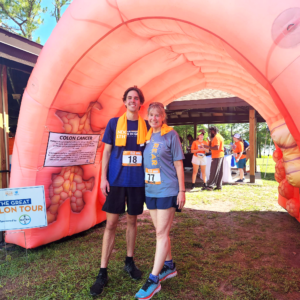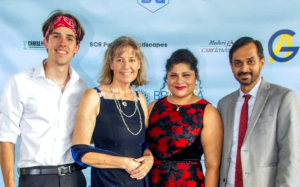A Mission of Prevention: Colon Cancer Survivor Promotes Screening

A wife, mother and career woman, Karen Fisher lives a busy life in Inverness, Florida.
Fisher’s life turned upside down when she was diagnosed in 2020 with Stage 2A colon cancer. She was 54.
“Colon cancer wasn’t really even on the radar,” she said. “So, it was kind of a shock.”
The American Cancer Society (ACS) estimates about 106,590 people will be diagnosed with colon cancer and about 46,220 with rectal cancer in 2024.
Now the 57-year-old colon cancer survivor helps newly diagnosed colorectal cancer (CRC) patients find support resources and encourages adults to get timely screenings.
“I have been able to help friends, coworkers and neighbors get screened for colon cancer,” Fisher said. “It makes me feel good to be able to help other people prevent going through what I went through.”
March is National Colorectal Cancer Awareness Month. This monthlong campaign promotes the research, prevention, diagnosis, treatment and, ultimately, cure for this disease. CRC is an umbrella term for cancer in the colon or rectum.
Don’t Make Excuses About CRC Screening
In 2016, experts recommended colorectal cancer screenings begin at 50 for people at average risk for the disease. Fisher turned 50 that year but made excuses to postpone her screening.
“I was busy with work and teenagers and after-school activities, and you know, moms take care of everybody else but themselves,” she said. “I had even driven my husband to his colonoscopy when he turned 50. He’s five months younger than me.”
In 2021, the U.S. Preventive Services Task Force lowered the screening age to 45 because of an increase in cancer in younger people. Now, CRC is the number one cause of cancer death in men and the second in women younger than 50.
Fisher had no family history of CRC and did not think she had any symptoms.
“I had blood in the stool, but at the time I was perimenopausal, and I thought I was spotting between periods,” she said. “Looking back, I can recognize that yes, I had a symptom.”
Fisher’s health insurance required her to get a colonoscopy at the hospital where she works as a pharmacist. She did not feel comfortable getting screened there.
“That was one thing that prevented me from getting screened in a timely manner. I didn’t want to get naked in front of my coworkers,” she said. “I knew everyone in the endoscopy department. I didn’t want them to see me, so I put it off.”

Colonoscopy Reveals Cancer Diagnosis
Four years later, in May 2020, Fisher tried to donate blood but was turned away because her hemoglobin level was low.
“I thought that was kind of weird because I was otherwise healthy. I’d been running for two years just for exercise and didn’t really notice anything,” she said.
Blood tests revealed Fisher had iron deficiency anemia. To determine the cause, her family doctor ordered a colonoscopy, a procedure that allows a gastroenterologist to examine the entire length of the colon for polyps or other abnormalities.
Because of the COVID-19 pandemic, a backlog of cases at the hospital and the urgent nature of her anemia, she got a medical exception to have the procedure at an ambulatory surgery center nearby.
Gastroenterologist Trupti Shinde, MD, performed the colonoscopy and found a 5 cm mass in Fisher’s colon. Dr. Shinde referred Fisher to Parth Patel, MD, general surgeon, to remove the tumor and scheduled surgery in July 2020. Pathology revealed Stage 2A colon cancer.
“It was just such a whirlwind of activity with me. You know, me still trying to work full time, too, and trying to process all of this in my head,” Fisher said. “I did a lot of research online and found a lot of good resources. I wanted to share them with other colon cancer patients.”
A Foundation to Help CRC Patients
About six months post-surgery, Fisher scheduled a follow-up appointment with Dr. Shinde. They discussed the need for a support group and resources for colon cancer patients.
“I always felt there is no support system for them,” Dr. Shinde said of CRC patients. “We are doing a good professional job, but I felt there was a lack of connection if they needed emotional support. I was always unhappy about that situation.”
The duo began offering support groups at the local library without much success. Undeterred, they compiled a list of patient resources and produced a pamphlet designed by Fisher’s son. Then they shared the pamphlets with local surgery centers and healthcare facilities for distribution to CRC patients.

From this outreach, Fisher worked with Dr. Shinde and Dr. Patel to create the nonprofit Citrus Colorectal Cancer Foundation in June 2021, Fisher’s one-year “cancerversary.”
The foundation offers direction for educational, financial and emotional support for CRC patients, caregivers and the community. The foundation is planning ColonFest ‘24 on March 23 and the second annual Charity Casino Night in April.
In the future, Dr. Shinde wants to expand the foundation’s mission.
“My dreams are very big,” she said. “I want to have a foundation presence globally because (colorectal cancer) is not only a problem for the United States.”
From Pain to Purpose
As a colon cancer survivor, Fisher’s pain has emerged into purpose.
“I feel like maybe this was God’s plan for me that I went through this,” Fisher said. “And now He’s guiding me to help others go through it and prevent what I went through.”
To raise awareness, Fisher often shares her story at luncheons, healthcare fairs and community events. To describe CRC and the importance of screening, she often uses a gardening metaphor.
“I talk about weeding your intestinal garden,” she said. “Think of polyps as weeds that could take over your body and kill you — just like weeds can rob your garden of nutrients and kill your plants.”
Colorectal cancer begins as a polyp, a small cluster of cells in the lining of the colon (large intestine) or rectum.
“There are many types of colon cancer screenings available these days, but I always recommend a colonoscopy,” Fisher said.
Colonoscopy is the only screening method that can detect and prevent colorectal cancer. During this procedure, a doctor can find and remove any polyps — often before they become cancerous.
If you choose to take a stool test and you receive a positive result, you will need a follow-up colonoscopy to determine the cause.
Schedule Your Colonoscopy at Age 45
Colorectal cancer diagnosis in adults 40-49 has increased by nearly 15 percent in the past decade. Experts recommend that colorectal cancer screening begin at age 45 for adults who are at average risk.
“There are a lot of messages that I like to spread for the younger people,” Fisher said. “Number one is it might not be hemorrhoids or gluten intolerance or IBS (Irritable Bowel Syndrome). The only way to know for sure is to get scoped. You’ve got to find out for sure.”
Early detection is key in CRC because it is more treatable in the early stages.
“Prevention is a cure, and we have to prevent bad things,” Dr. Shinde said. “I tell my patients, if you’re healthy and you want to do all these things in your life, then you are the perfect candidate to get the colonoscopy because it’s the best preventive tool.”
Coverage of colonoscopy differs with health insurance policies. In most cases, there should be no out-of-pocket costs (such as copays or deductibles) for CRC screening tests. You should contact your health insurance provider to verify any charges and to approve a colonoscopy before age 45.
Getting screened if you are 45 or older is critical to detecting and even preventing colorectal cancer. Call today to make an appointment.
This article is designed for educational purposes only. The information provided should not be used for diagnosing or treating a health concern or disease. It is not a substitute for professional care. If you have or suspect you may have a health concern, you should consult your healthcare provider.
